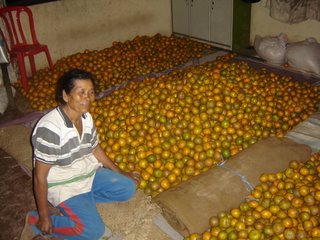Jeruk

This is a warehouse full of oranges that can’t be sold. The woman, like most of the people in Sumbul, survives by selling fruit grown in the fertile mountain soil in the area around Lake Toba. The cool nights with no frost and warm days make for very sweet produce.
But the buying price for vegetables and fruits from this district has dropped 80 percent over the last month, from about 30 cents a kilo to about six cents. No one will buy fruit from Karo because they are afraid of bird flu, she tells me.
The price is so low that they refuse to sell. It’s not worth paying for transportation or for the market sellers’ fees. The barn already smells fermented like old orange juice. Even so, I try one of the oranges being passed around to the army and police. It's like a little bag of orange sugar.
The drop in prices has created an economic disaster that they won’t be able to recover from until the next crop - next year.
Here she desperately shows me the storage barn and her crop. She guided me around, firmly pulling at my elbow. I have told the villagers I’m working for American radio. They ask me if I can do anything to help, if I can get money for them to live. Like most people I’ve met in rural communities, they assume I have connections to the World Bank or an NGO that can provide assistance. I try to explain that’s not really how it works, but I can tell I’m not getting through.
Today they took all my chickens, she says. About a hundred of them.
In economic terms, that’s about a hundred and fifty dollars. Not counting the eggs.
I tell them I’ll tell people in America what’s happening here, how ignorance about bird flu is destroying their town. They’re full of hope when I say that.
